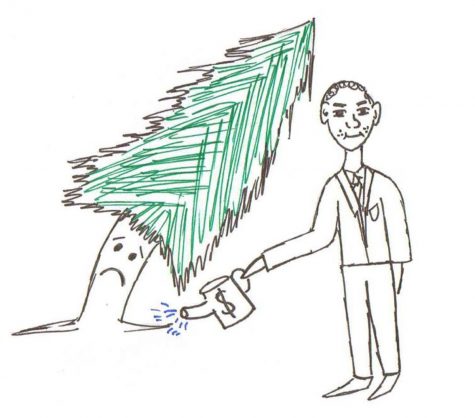‘Becoming’ by Michelle Obama, a memoir written by a woman America does not yet deserve
November 15, 2018

Photo by Emma Kostroski-Polucha
‘Becoming’ is the autobiographical memoir of former United States First Lady Michelle Obama published in Nov. Described by the author as a deeply personal experience, the book talks about her roots and how she found her voice, as well as her time in the White House, her public health campaign, and her role as a mother.
Some people look up to the President, some people look up to a different idol, but some people look up to the First Lady, one of the most important women’s roles in the United States. When that First Lady writes a book and people swarm to the bookshelves to buy it, the bestseller creates a unique community, and she can become a more significant influencer than her husband.
Ever since the Becoming’s release on Nov. 13, Michelle Obama has been seen all over the country, talking about her past and the kind of world she grew up in, which was very different from the one that we live in today. She shares difficulties and opportunities she faced as a young black woman on the South Side of Chicago and how growing up in that community affected her position as a first lady.
Obama is capable of blurring a person’s stance on things they stand firmly for or against. First is the concept of a First Lady. For feminists or anyone that has a grasp of gender equality, it can be a highly troublesome notion. It is a position that entails a woman – no matter the accomplishment or drama of her prior life – being squeezed into a role that is about the man to whom she is married.
The former First Lady’s role has never been clarified, because, to do so would involve the cumbersome truth – that it is mainly to make her husband look good. First Ladies both feed into, and mirror, our patriarchal values, and so, in this world still so rigid of female domination, making their husbands look good inevitably involves diminishing themselves and decoupling from their achievements, so as not to outshine the president.
The rumors and slanted commentary always carried less than subtle messaging about race, meant to stir up the deepest and ugliest kind of fear within the voting public. Don’t let the black folks take over.
— Michelle Obama
“The process of writing this book has been so personally meaningful and illuminating for me. As I prepare share Becoming this fall, I hope you’ll also think about your own story, and trust that it will help you become whoever you aspire to be. Your story is what you have, what you will always have. It is something to own,” Obama wrote on her Instagram.
Obama is both the apex First Lady and also has been bunched into a narrative of the American dream. This is problematic from a black perspective because, as Malcolm X so crisply expressed it, “I do not see any American dream. I see an American nightmare.” Obama’s role has been in the American dream of both the future and the past.
However, it is directly amid the dark chaos of these problems that we find the hefty light of Michelle Obama. In Becoming – the first book that tells her story from her perspective – she discloses that her life is a form of alchemy. Her childhood, growing up on the South Side of Chicago, is recollected with a fundamentally American kind of wholesomeness: a stark family of four, sharing a one-bed apartment upstairs while her piano teacher great aunt Robbie occupied the one below.
Obama expresses herself in her early years as “the striver.” Later, campaigning for the first time with her husband, she recalls the moment she realized that her task is predominately to share this story with “people who despite the difference in skin colour reminded me of my family – postal workers who had bigger dreams just as [her grandfather] Dandy once had; civic-minded piano teachers like Robbie; stay-at-home moms who were active in the PTA like my mother; blue-collar workers who’d do anything for their families, just like my dad. I did not need to practice or use notes. I said only what I sincerely felt.”
The writer Ta-Nahesi Coates, present at one of these events, was so taken aback by her account of an “idyllic youth” that he “almost mistook her for white”, comparing her, in his book We Were Eight Years in Power, to “an old stevedore hungering for the long-lost neighborhood of yore”. “In all my years of watching black public figures,” he said. “I’d never heard one recall such an idyllic youth.”
However, this protective love of Obama’s childhood did not shut out the common sense of suffering and injustice that is, for any observer of America, impossible to avoid. The neighborhood she grew up in was transformed by white flight, and later “deteriorated under the grind of poverty and gang violence.” Early experience with the police via her beloved brother Craig taught her that “the color of our skin made us vulnerable.” Persistent experiences of discrimination bred in her family “a basic level of resentment and mistrust.”
Most of Obama’s narrative on race, however, comes courtesy not of her perspective, but that of the many commentators who weaponized her blackness against her. “The rumors and slanted commentary always carried less than subtle messaging about race, meant to stir up the deepest and ugliest kind of fear within the voting public. Don’t let the black folks take over,” she writes. Obama recalls the “angry black woman” messaging, and the time “a sitting U.S. congressman … made fun of my butt.”
However, in its serious tone, Becoming leaves out far more of this sordid history than it chooses to recall. The New Yorker magazine cover depicting her as an armed Black Panther, for example, the time Fox News ran an onscreen graphic describing her as Barack Obama’s “Baby Mama” – like the earlier “welfare queen” trope, a dog whistle appeal to the idea that, if the black family is at the root of America’s problems, how could one of them possibly be part of its solution? Alternatively, the time Fox host Bill O’Reilly said, “I do not want to go on a lynching party against Michelle Obama unless there is evidence.”
Becoming is a 400-page expansion of this essential doctrine, without compromising a refreshing level of honesty about what politics did to her. This is like inserting a missing piece of reality into the narrative of her dizzying journey. There are brilliant details from their love story, like the time she tried to set him up with other single women, only to discover he was just “too cerebral” for Happy Hour nights where single people would mingle. There are compelling insights into the sorrow of miscarriage, the loneliness of living with a man whose sense of purpose often left little room for anything else, prompting her to seek couples counseling lest their marriage fall apart.
“Coexisting with Barack’s strong sense of purpose – sleeping in the same bed with it, sitting at the breakfast table with it – was something to which I had to adjust,” she writes. Her honesty about home life – the pressure of childcare, bills, debts, work, and parenting – are unusual because they are so reasonable, and because normal is something she has never been allowed to be.
It is hard to be cynical about either Obama’s strength of character or her authenticity. Her book confirms what was observable about her time in the White House, that while she may have had to shape herself into the mold of what politics requires of a first lady, it was still a first lady-shaped version of something real. Her genuine dislike for politics is hard to avoid, in a book rooted in a high moral ground above insults and mudslinging, the political process itself seems the only thing she allows herself to insult freely.
“The appeal of standing in an open gym or high school auditorium to hear lofty promises and platitudes never made much sense to me,” she writes. “The political world was no place for good people,” nothing but “the ugly red versus blue dynamic,” whose “nastiness” has affected her so personally. In this vein, she attempts to end the stubborn speculation about her future candidacy. “Because people often ask, I will say it here, directly: I have no intention of running for office, ever.”
The vibrant diversity … was gone, replaced by what felt like a dispiriting uniformity, the overwhelmingly white and male tableau I’d encountered so many times
— Michelle Obama
It is the one time the reader feels like he or she maybe know more about her than she knows herself. A few slights against politics and a one-sentence declaration that she will never run for office does not quite cut it after so many pages of what is, unquestionably, a political book. It is hard not to recall the time when asked about the challenges of her husband’s political marathon, and she once replied, “this is nothing compared to the history we come from.”
During Barack Obama’s tenure, it was Michelle Obama’s roots in the African American experience, in the history of the south that she understood innately as “knit into me,” that lent him crucial legitimacy among black voters. It resurfaces here, adding the profound warnings of past suffering to the observation that, as she sees the Trumps take over the White House.
Becoming reads like Obama’s first intervention into this distressing new reality. It does not read like it will be the last.


